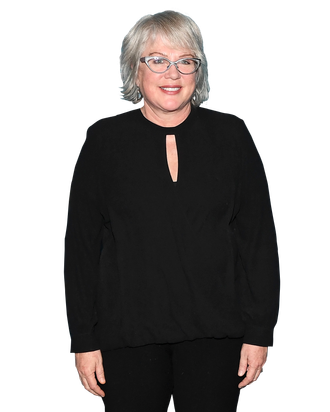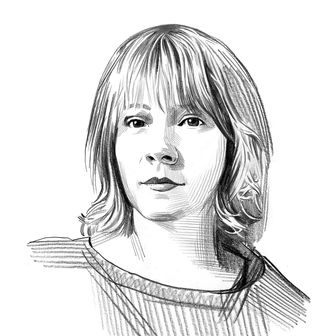
Julia Sweeney had left showbiz for more than a decade. The Saturday Night Live alum decided to move to Illinois, just outside of Chicago, to be with her now-husband and raise her daughter. But with her daughter recently off to college, Sweeney is ready to swing back into comedy. Cue Shrill.
In the Hulu comedy, Sweeney plays Vera, the micromanaging mother of Annie (Aidy Bryant) who has unknowingly sabotaged her daughter’s sense of self-worth with constant weight-loss talk. But over the course of the debut season, Vera’s chipper, control-freak façade slips to reveal a flawed woman who is just trying her best to cope. Sweeney has seen both sides of that mother-daughter weight-loss divide: When she was younger, it drove her up the wall when her mother and aunt stressed about whether food was “good” or “bad,” and her new one-woman show, Older and Wider, takes its title from a sort of defeated sense of body acceptance. In a recent conversation with Vulture, Sweeney shared her thoughts about her Hollywood comeback, the difference between playing a sketch mom and a TV-series mom, and how comedy has changed since her SNL days.
How has it been reentering the acting world?
About a year and a half ago, I did this event with Bob Odenkirk, who’s a friend. I said, “When [my daughter] Mulan graduates from high school, I’m moving back to L.A. I’m going to try and restart my career.” He was very supportive, but he said, “You have to really think it’ll take two years to get back,” which is a totally reasonable thing to say. It was mostly arbitrary, but in my mind I suddenly had a date and time. It’ll take me two years, it’ll take me two years. But then I got Shrill last summer. I hadn’t even moved back to L.A. and I had a series, which was so incredible. In a way, though, he’s still right. Getting the parts on TV has been the easiest part of moving back. That goal got achieved very quickly. Now I’m trying to get back into the comedy scene in LA. I’m doing my show at Largo. I’m trying to remind my comedian friends that I’m a good person to have onstage. It’s just a slower part of it. I think it will take two years for me to feel like I’m really back.
How did Shrill come to you?
My agents called me about it and I loved the script so much. Because I left show business ten years ago, before everybody self-taped all their auditions, I didn’t even know how to do that. That’s a really common thing now. I had this ridiculous first audition where I was just holding the phone, kind of doing the part and then laughing in between. And they were like, “We really want you, but you have to do a real audition.” When I look back on it, they were really kind. Most people would have told me to fuck off.
It’s in character, though, for a mom to not know how to self-tape.
That’s what I thought! I would start doing the scene, then stop and say how much I loved the script. But then I really did the audition and I got the part. When I was on the set, Aidy said that Lorne [Michaels] had brought my name up right away. Which doesn’t mean that I would have just been handed the part, but I think I was at least in Lorne’s mind.
Was there a sense of SNL camaraderie on set? I’ve heard that when two people who were on the show at different times meet, it’s kind of like people who went to the same college at different times.
Actually, because SNL is such an incredibly intense experience, it’s more like meeting family members that you’ve heard about but never met. You’ve heard stories about her your whole life, but now here she is! It feels more like that, at least it did for me when I met Jane Curtin and Laraine Newman. You kind of felt like you knew them.
Aidy was just on The Tonight Show, and she said she took the entire cast to a strip club in Portland. Were you a part of that excursion?
No, I was not!
Are you mad now?
Yes! I’m livid. No, I’m not really livid. I’m the mom.
Speaking of, you also played moms occasionally on SNL. What’s the difference between playing a sketch mom and playing a more grounded mom in a series? Does it change after raising a child of your own?
Before I had a kid, I was on the kid’s side of things. Then when I had one, I was on the parents’ side. So before I had a kid, when I played a mom it was broader and more cartoonish. Inside me, it was like, “Isn’t she ridiculous?” But then when I became a mom, I went to the other side. “Of course I’m acting appropriately, and aren’t children narcissistic and ridiculous?” I switched teams.
This show captures both sides of that mom-daughter divide really well.
My character is sympathetic. She’s doing the mom thing, but that’s a service. It’s funny, even the character description said she was passive-aggressive in her needling to diet or exercise or whatever. I mean, I wouldn’t order food for a kid. I’ve had my own struggles with weight and my own issues with my mother, I’m so sensitive to all of it. But other than the ordering of the food, I feel like everything my character said is something I would say. “Isn’t it great to exercise? Isn’t it so much fun to be outside exercising?” Yes, there’s a little edge to it. But I guess I’m still on her side about it. It is fun to exercise!
My mom definitely does the move where she uses positive reinforcement and congratulates me for something she’s wanted me to do for a long time. And somehow, that makes me never want to do it again.
Oh God, you should get together with my husband and daughter. What are you supposed to say? I have positive responses when people do things I like! What am I supposed to do, hide that?
I don’t know.
I guess you have to be more artful about it. My husband and daughter would both say the exact same thing you just said. I’m being unartful. I have to be more sneaky in the way I give positive reinforcement, so that they don’t even realize that it’s happening.
So they think it was their idea.
Right!
Can we talk a little bit about the issues with weight? That was one of the most powerful parts of the show, the way these attitudes about food transfer from one generation to another. You got some of that messaging from your mom?
Yeah, it was a huge part of my relationship with my mom. I understand it, sort of. Of course, I have my gripes. I feel like she was unartful in her goading me to be thinner. Maybe that’s a universal thing.
My mom used a lot of moral language around food. “I was good today,” or, “Let’s be bad and have dessert.”
I hate that so much. I really try to not do that. I could go on for the next three days, but I hate that moralizing about good food and bad food. My mom and my aunt — whom I love so much! — if I could take away something from their lives, it would be all the self-hate and self-reprimanding. The “now I’m good, now I’m bad” about food. Because it’s my belief that it didn’t make one pound of difference in their weight. It just took up a huge part of their thinking about themselves.
In the time you’ve been in Illinois, this sort of “issue comedy” has come back into vogue. How are you finding this new shape of comedy?
In some ways, I think it’s great. I was kind of doing that for 20 years. When I did God Said Ha!, my first monologue, that was about cancer, but it was a comedy. Letting Go of God, that was about religion, but that was a comedy.
A year and a half ago, I was trying to decide how I would get back into show business. Would it be a script? Would it be another one-person show? I spent a summer with my daughter watching one Netflix comedy special a day. I was shocked. I hadn’t really watched anything for ten years. I was amazed. You could talk about really personal things, you could talk about painful things. It was more storytelling, and it didn’t have to be “joke, joke, joke.” I realized it had really changed a lot, and it was more like what I was comfortable doing. So then I developed the show that I’m doing now, Older and Wider. It isn’t a one-issue thing; it’s more like what Mike Birbiglia does. I’m trying to remember what shows I’d seen …
Did you see Nanette?
Yes, of course I saw Nanette. I really liked it a lot, and I appreciated it so much. And I was inspired by it. My beef with stand-up was that it felt like fast food. It didn’t feel like a satisfying meal. And it’s changing now to be more like a meal. That’s what I like to think I was doing. It’s what I’m more capable of doing. The world is full of chronic issues, like weight and cancer and religion, that are also really funny.
This interview has been edited and condensed.


